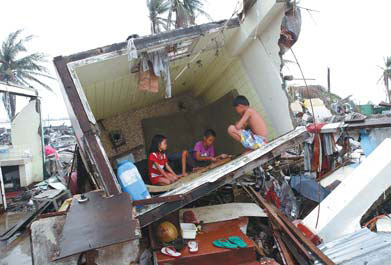Authorities struggle to keep typhoon aid corruption-free
As millions of dollars pour in for more than 4 million left homeless by a typhoon in the central Philippines, authorities are grappling with a familiar problem - how to stop fraudulent claims and prevent greedy politicians taking advantage.
Nearly 13 billion pesos ($297 million) in cash and relief goods have so far been pledged by countries and donor groups to an overwhelmed government that was criticized for its slow response in the first few days after disaster struck.
The World Bank and the Asian Development Bank have committed a total of more than $1 billion in grants and emergency loans to support reconstruction and relief efforts.
Add to that the millions of pesos raised by the private sector, with Filipinos working across the globe gathering friends for fund-raising activities, and a lucrative target for scammers and unscrupulous public officials in one of the most corrupt countries in East Asia has piled up.
The Philippines comes in at number 105 out of 176 countries in Transparency International's corruption perceptions index, with the cleanest country, New Zealand, at number one.
"It is a big issue in the international aid community, especially insofar as international NGOs are concerned," said Budget Secretary Florencio Abad, when asked about bogus aid agencies and scams.
Tricare, a healthcare program providing insurance to US military personnel and retirees worldwide, received claims for damaged homes from 2 million people from the typhoon-devastated city of Tacloban, when the population before the storm struck was only 220,000, said Andrea Colley-Lopez, a program manager at International SOS Assistance Inc, which provides support for groups including Tricare.
"The Philippines is always going to be the bane of our existence," she said, adding medical service providers had also submitted fraudulent claims for damaged hospitals, complicating insurance groups' responses to legitimate typhoon victims.
Reuters
|
Typhoon survivors play games inside the bathroom of a house, toppled by Super Typhoon Haiyan that battered Tacloban city nearly two weeks ago, in central Philippines on Thursday. Erik De Castro / Reuters |
(China Daily 11/22/2013 page12)









